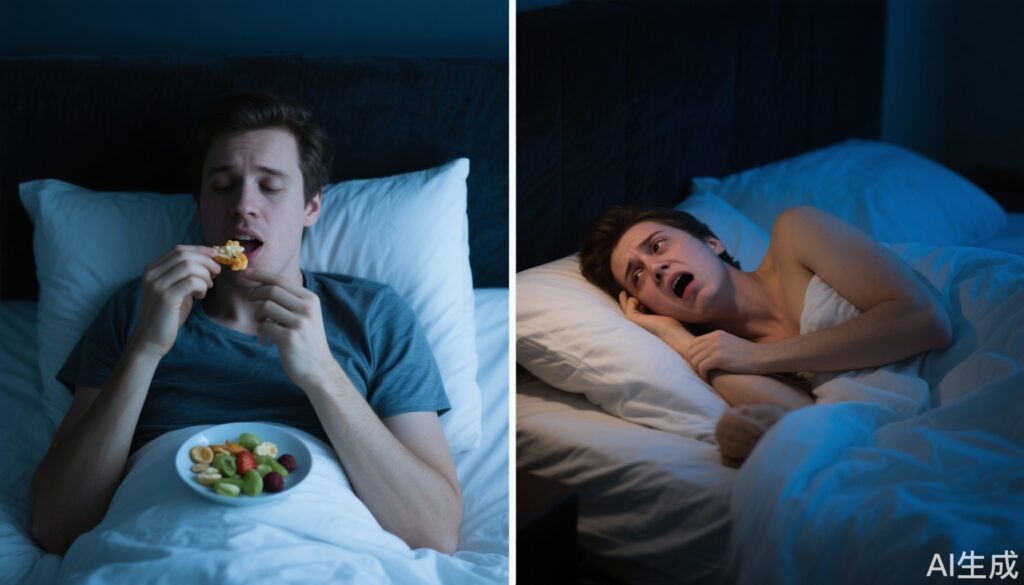Introduction
In recent years, dietary trends like skipping dinner or following time-restricted eating plans—such as the 16+8 method where food intake occurs between 9 AM and 5 PM—have gained popularity for weight loss. These approaches often leave individuals facing a dilemma: is it healthier to eat a late-night snack before sleeping or to go to bed hungry? This article explores the scientific evidence, common misconceptions, and practical advice about these lifestyle choices to clarify their impact on health.
Is Eating a Late-Night Snack Really Unhealthy?
Many people believe that eating snacks right before bedtime inevitably leads to weight gain. However, scientific understanding indicates that weight gain primarily depends on the balance between total caloric intake and energy expenditure, rather than the specific timing of food consumption. Excess calories—whether consumed during the day or at night—can be stored as body fat, accumulating in areas such as the abdomen, hips, and thighs.
For those attempting to lose weight, reduced food intake during the day often results in increased hunger at night. In these cases, having a light, controlled snack can be beneficial to avoid excessive hunger, which might undermine dietary adherence. Conversely, individuals who eat substantial meals throughout the day and still consume late-night snacks may experience weight gain due to an overall calorie surplus.
However, it is important to note that eating late can burden the digestive system and may stimulate brain activity, potentially leading to difficulty falling asleep or poorer sleep quality. Moreover, late-night overeating can contribute to conditions such as Night Eating Syndrome (NES), a disorder characterized by excessive caloric intake at night, morning anorexia, and frequent nocturnal snacking over extended periods. NES patients typically consume over 50% of their daily calories post-dinner and exhibit a higher risk of obesity.
The Risks of Going to Bed Hungry
Does skipping dinner and falling asleep hungry offer better health outcomes? The answer is nuanced. The body’s daily energy and nutrient needs remain relatively stable; therefore, missing a meal without compensating elsewhere often results in inadequate nutrient intake. Habitually going to bed hungry may produce symptoms of malnutrition, including fatigue, low mood, diminished concentration, and an unhealthy complexion.
Certain populations face heightened risks when skipping dinner. For example, individuals with gastrointestinal ulcers may experience symptom exacerbation due to prolonged fasting. Shift workers requiring sustained alertness during nighttime hours also need steady energy supplies, making skipping evening meals potentially detrimental.
That said, selectively skipping dinner may be appropriate for:
– Those who consumed a large lunch or afternoon snacks and have minimal physical activity afterward.
– Individuals actively trying to lose weight with a body mass index (BMI) above 28, where calorie restriction can be part of weight management strategies.
Healthy Approaches to Nighttime Eating
From a health perspective, maintaining a regular meal schedule with balanced nutrition is ideal. Avoiding dinner is generally discouraged unless managed carefully, and excessive late-night eating should be moderated.
When choosing to eat a late-night snack, consider the following guidelines:
1. **Timing:** Aim to eat the snack 1 to 2 hours before bedtime to minimize sleep disturbance and assist digestion.
2. **Food Choices:** Opt for light, nutritious options such as fruits, whole grains, legumes, and dairy, which are easier to digest and lower in fat, salt, and sugar. Avoid heavily processed foods like instant noodles, fried items, or spicy dishes containing stimulants such as chili or pepper.
Who Benefits from Eating a Late-Night Snack?
Certain groups may require or benefit from nighttime snacks:
**1. Individuals with Diabetes:** To prevent the “dawn phenomenon,” a rise in blood sugar in the early morning, diabetics may find a modest, healthy snack before bed helps keep nighttime glucose levels stable.
**2. Patients with Stomach or Liver Disease:** These patients often suffer from reduced appetite and early satiety. A small nighttime meal, such as porridge, steamed buns, noodles, or dumplings, eaten about two hours after dinner, can ensure adequate nutrition without disrupting daytime meals.
**3. Frail Elderly Individuals:** Aging decreases gastrointestinal function, and combined with chronic illness, can cause appetite loss and unintended weight loss. A pre-sleep snack supports nutrient absorption and helps maintain body weight without interfering with main meals.
What to Do If You’re Suddenly Hungry Before Bed?
If hunger strikes close to bedtime, follow these tips:
– Eat your snack 1 to 2 hours before sleeping to allow digestion and reduce sleep disruption.
– Choose light foods, such as a glass of milk, whole wheat bread, or plain crackers.
– Avoid overeating; the goal is to alleviate hunger, not induce fullness, to prevent excess calorie storage as fat.
Case Scenario: Sarah’s Nighttime Hunger Dilemma
Sarah, a 35-year-old office worker, recently started intermittent fasting from 9 AM to 5 PM aiming to lose weight. While she noticed initial weight loss, she found herself ravenous at night. Ignoring hunger, she went to bed hungry but woke frequently, feeling fatigued at work. After consulting a nutritionist, Sarah adjusted her routine to include a small nighttime snack of low-fat yogurt and fruit about 90 minutes before sleep. This change helped her manage hunger, improved her sleep quality, and maintained her weight loss progress sustainably.
Conclusion
The choice between eating a late-night snack and going to bed hungry depends on individual circumstances, overall dietary habits, and health goals. Weight gain is determined by total caloric balance rather than meal timing alone. Excess calorie intake, particularly from unhealthy foods, poses risks regardless of when consumed. Meanwhile, skipping dinner without proper management can lead to nutritional deficits and adverse symptoms.
Optimal health favors regular balanced meals and mindful snacking when necessary, particularly choosing nutrient-dense, easily digestible foods eaten 1 to 2 hours before bedtime. This approach supports metabolic needs, sleep quality, and overall well-being.
References
1. Dashti HS, Scheer FAJL, Jacques PF, et al. Timing of Food Intake Predicts Weight Loss Effectiveness. Obesity (Silver Spring). 2017;25(4):572-578. doi:10.1002/oby.21719
2. Stunkard AJ, Grace WJ, Wolff HG. The Night-Eating Syndrome: A pattern of food intake among certain obese patients. Am J Med. 1955;19(1):78-86.
3. Schoenfeld BJ, Aragon AA. How to approach the management of fasting and eating windows for weight loss. J Int Soc Sports Nutr. 2018;15:39. doi:10.1186/s12970-018-0230-8
4. American Diabetes Association. 6. Glycemic Targets: Standards of Medical Care in Diabetes—2023. Diabetes Care 2023;46(Suppl 1):S97-S110.
5. Johns Hopkins Medicine. Night Eating Syndrome. Available at: https://www.hopkinsmedicine.org/health/conditions-and-diseases/night-eating-syndrome



